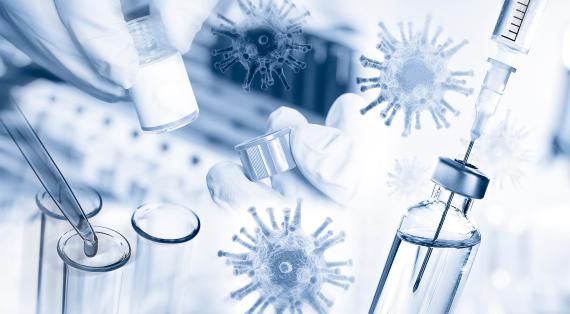Asset Publisher
Biotechnology and Genetic Engineering
Innovation Potential – Opportunities Versus Risks: Why Do We Need Biotechnology and Genetic Engineering?
Asset Publisher
Why Is Biotechnology an Important Social Issue?
Biotechnology and genetic engineering rank among the innovative cross-sectional technologies. They harbour high economic potential and they can help us meet pressing challenges. How do they need to be promoted? What framework conditions are necessary for responsible use? What is more: Where are the boundaries that must not be crossed?
Biotechnology and genetic engineering are not just a topics for experts, it concerns us all. Science and research bear responsibility for society. Politics and society help shape scientific progress.
What Is Biotechnology?
In biotechnology, organisms (for example bacteria, fungi, cell cultures) or their components (such as enzymes, other protein etc.) are used for technical processes. Genetic engineering is a new and particularly innovative field based on research, targeted artificial modification and the use of DNA (DNA = genetic material). DNA-based research is an important basis for biotechnology and genetic engineering with the greatest potential for innovation.
What Is Old, What Is New?
Micro-organisms were used even at a very early stage in human history – beer, cheese, sour dough, but also penicillin are well-known examples of this. However, it was only in the 1960s that biotechnology became really innovative when it succeeded in specifically modifying the genetic material of living organisms. Genetics, molecular biology and cell biology resulted in an enormous dynamic that continues today.
What Are the Fields of Application?
DNA and the genetic code are common to (almost) all living things. The development of sophisticated methods for precisely analysing and specifically modifying DNA has led to a broad field of application:
- Health (“red” biotechnology/genetic engineering): basic biological/medical research; medical diagnostics and therapy; drugs, vaccines, antibiotics, hormones;
- Industry (“white” biotechnology/genetic engineering): R&D and production of biogenic substances: Food supplements (e.g., vitamins), technically usable enzymes (e.g., detergents), novel biogenic energy sources (substitutes for fossil energy sources), bio plastics;
- Agriculture/nutrition (“green” biotechnology/genetic engineering): Breeding research, plant and animal breeding.
What Goals Are Being Pursued?
Biotechnology and genetic engineering are used
- so as to better understand the biological processes;
- to fight disease (cancer, infectious diseases, hereditary diseases, rare diseases, age-related diseases);
- to secure and improve nutrition (improving food quality, changing agronomic characteristics);
- to tap into new resources (including energy sources) (increasing efficiency, bio materials);
- to improve environmental protection (environmental analytics, environmentally-friendly products and processes, bioeconomy)
Biotechnology and genetic engineering are not a “silver bullet”, their opportunities and risks must be weighed up unemotionally and objectively, however, they do play an important role in addressing the major challenges we face.
Economically speaking, they are essential in the above-mentioned areas and therefore rightly rank among the innovative technologies of the future.
Research (cf. PCR, CRISPR/Cas, iPS cells, NGS, genomics) drives development and maintains innovation at a high level.
What Is Socially Relevant?
The Corona pandemic has strikingly reminded us about the need for biotechnological and genetic engineering innovations and the great efficiency of this high-tech industry: All Sars-CoV-2 diagnostics, therapeutics and vaccines (not only the novel RNA vaccines) are unthinkable without biotechnology and genetic engineering. The problem-solving and innovative potential have become clear both in the clinical and pharmaceutical industry.
Particularly noteworthy is the close collaboration between basic research (e.g., virology, molecular biology), small innovative biotech companies and major pharmaceutical firms: The boundaries between (basic) research and (economic) application are becoming blurred.
The Corona crisis also brought the need for political regulation to the fore: R&D funding (financial and structural), framework conditions for innovating companies; as well as legal-ethical questions that society has to address in connection with biotechnology and genetic engineering (biological safety, social justice, ethical-legal permissibility).
What Needs to Be Discussed?
The following socio-political questions emerge in connection with biotechnology and genetic engineering, which are discussed by the Konrad-Adenauer-Stiftung:
- What are the major challenges that can be solved by biotechnology and genetic engineering? Where can they help? Where not?
- What is the economic potential of biotechnology and genetic engineering?
- How does the state of biotechnology and genetic engineering in Germany compare to other high-tech locations worldwide?
- What framework conditions are necessary for strengthening biotechnology and genetic engineering?
- Where are the risks?
- Which social aspects need to be taken into account?
- Where are the red lines that must not be crossed?
Why Do on Biotechnology and Genetic Engineering Need to Come Under the Spotlight Again?
The COVID-19 pandemic, in particular, has helped, by means of Sars-CoV-2 diagnostics, therapeutics, and vaccines, which would have been inconceivable without biotechnology, to focus greater political, economic, social and public attention on the topic of biotechnology again.
In connection with rapid advances in biotechnology and genetic engineering and against the backdrop of changing framework conditions, Germany needs a new “biotech strategy”. Here it is a question of how we can use biotechnology and genetic engineering responsibly.
The Konrad-Adenauer-Stiftung addresses all these important questions and aspects on this topic page. Here, you will consistently find new background information in the form of studies, current news and events on this important future issue.
Asset Publisher
Asset Publisher
Publications
Publications
 pressmaster, stock.adobe.com
pressmaster, stock.adobe.com
„Plant breeding is an agricultural success story“
Interview with Christopher Sieler: The potential of new breeding techniques from the perspective of the agricultural industry
-
André Algermißen
-
June 29, 2023
-
Single title
 uaPieceofCake, stock.adobe.com
uaPieceofCake, stock.adobe.com
Genome Editing: An important tool in our agriculture toolbox
Interview with Dr. Oliver Vogt MdB: The importance of new breeding techniques for the future of agriculture from a political perspective
-
André Algermißen
-
June 22, 2023
-
Single title
 AdobeStock/juanjo
AdobeStock/juanjo
Regionen auf dem Weg zum European Green Deal
Auf dem Weg zum European Green Deal: Die Teilnehmenden zeigen sich motiviert, das eigene Handlungsfeld sowie die eigene Region im Sinne des EGD zu entwickeln.
-
Verena Ringler, Claudia Crawford, Michael Stellwag
-
October 7, 2022
-
Facts and Findings
 Image Source RF, stock.adobe.com
Image Source RF, stock.adobe.com
Biotech-Branche in Deutschland
Zur Position der deutschen Biotechnologie-Unternehmen: Potenzialanalyse und Handlungsempfehlungen
-
Thomas Gabrielczyk
-
December 10, 2021
-
Facts and Findings
 Bogdan / stock.adobe.com
Bogdan / stock.adobe.com
Pharmastandort Deutschland
Ist die Versorgungssicherheit mit Arzneimitteln gefährdet?
-
Dr. Norbert Arnold
-
November 15, 2021
-
Facts and Findings
 planpolitik
planpolitik
Planspiel für Schulen und weitere Gruppen
(Online)-Planspiel Grüne Gentechnik: Heilsbringer oder Teufelszeug?
-
October 20, 2021
-
Single title
Publications
Media library








